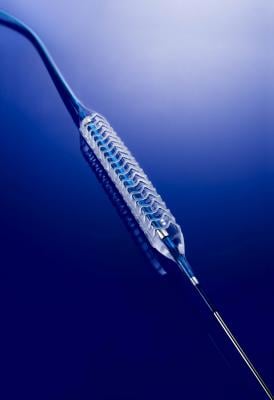
October 8, 2014 — Abbott announced the start of the ABSORB IV clinical trial, which will test whether the Absorb bioresorbable vascular scaffold (BVS) is more cost effective and offers a higher quality of life than a best-in-class, permanent, metallic drug-eluting stent. Absorb is the world's first drug-eluting BVS and functions like a metallic stent by opening up blocked blood vessels in the heart and restoring blood flow. However, unlike a metallic stent Absorb dissolves over time. ABSORB IV is designed to enroll approximately 3,000 people with coronary artery disease, mostly in the United States.
ABSORB IV is the first randomized heart stent trial to prospectively measure angina as a primary endpoint at one year. Measuring angina is significant because of its impact on quality of life and healthcare costs. Overall, people who have angina following a percutaneous coronary intervention (PCI) use more healthcare resources than those without angina. Studies have shown that while PCI with metallic stents is highly effective by reducing angina for 75 percent of treated patients, about 25 percent of people treated still experience angina over the course of the year following PCI. In addition, people with frequent angina typically have a lower quality of life because they are less likely to lead active lifestyles than those without angina.
Randomized data recently presented from the ABSORB II clinical trial, conducted primarily in Europe, showed that people treated with Absorb experienced significantly less angina compared to those who received a permanent metallic stent. The ABSORB IV trial is designed to confirm with these novel findings that treatment with the Absorb device can help provide people with heart disease a higher quality of life after a heart stent procedure.
The other primary endpoint of ABSORB IV assesses long-term clinical safety and performance based on the change in target lesion failure (TLF) from one to five years. TLF is a traditional endpoint in heart stent trials used to measure the safety and effectiveness of a device. Data from the ABSORB II clinical trial showed a similar rate of TLF between Absorb and Xience at one year. ABSORB IV is designed to demonstrate that this performance is consistent out to five years in people treated in the United States.
"The ABSORB IV trial will rigorously and prospectively examine whether there are differences in angina rates between a permanent stent and a dissolvable device after a percutaneous coronary intervention," said Gregg Stone, M.D., FACC, FSCAI, director, cardiovascular research and education, Center for Interventional Vascular Therapy, Columbia University Medical Center, New York-Presbyterian Hospital, and principal investigator of the ABSORB IV trial. "People care about their quality of life following a procedure, and this trial will allow us to measure that important outcome, in addition to traditional clinical endpoints."
Absorb is made of polylactide, a naturally dissolvable material that is commonly used in medical implants, such as dissolving sutures. Absorb is called a scaffold to indicate its temporary structure, and the scaffold provides support to the vessel until the artery can stay open on its own. Absorb slowly dissolves into the blood vessel, leaving behind a vessel that has the potential to resume more natural function and movement because it is not restricted by a permanent metallic stent.
In ABSORB IV, people will be randomly assigned to receive either Absorb or a best-in-class, drug-eluting permanent metallic stent, representing today's standard of care. The trial will implement rigorous measures to minimize patient bias and a patient perception effect. The first hospital to enroll people into the trial is the Christ Hospital Heart and Vascular Center and the Lindner Research Center in Cincinnati.
"The ABSORB IV trial is an important step forward in determining the relative clinical benefits associated with the dissolvable device compared with the permanent metal stent," said Dean Kereiakes, M.D., FACC, FSCAI, medical director, the Christ Hospital Heart and Vascular Center and the Lindner Research Center, and national co-principal investigator of the ABSORB IV trial. "Metal stents have been an important therapy for coronary artery disease for almost 25 years, but may have limitations. ABSORB IV is designed to demonstrate differences in clinical outcomes, angina symptoms and quality of life between stent types."
The data from the ABSORB IV trial will be combined with the data from the ABSORB III trial to create a population of more than 5,000 people studied in the U.S. This data set, which is the largest of its kind for bioresorbable heart devices, provides an opportunity to rigorously evaluate the performance of Absorb compared to the current standard of a metallic drug-eluting stent across a number of measures, including the broader health economic impact of this innovative therapy.
"ABSORB IV is a new approach to heart stent trials and the first time angina as a quality of life measure has been included as a co-primary endpoint," said Charles A. Simonton, M.D., FACC, FSCAI, divisional vice president, Medical Affairs, and chief medical officer, Abbott Vascular. "The current standard of care for narrowed coronary vessels offers strong clinical outcomes for most people. However, people continue to suffer from debilitating chest pain after their procedures, which lowers their quality of life and increases associated healthcare costs. By focusing on the patients and how they feel after a procedure, this trial sets a new bar for how we measure health outcomes and how we treat people with coronary artery disease."
For more information: www.abbott.com


 January 05, 2026
January 05, 2026 









